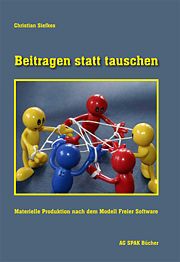 My last talk in Hiddinghausen was a little talk given as a complement to the Commons Network idea. The Commons Network is based on the idea of free and unconditional sharing—that others share with you goods they have or produce because they like to do so (and the other way around). This leaves, inevitable, the question: what if there is nobody who likes to share what you need (and you can’t produce it for yourself)? What if people need some additional incentives to produce what you would like to have?
My last talk in Hiddinghausen was a little talk given as a complement to the Commons Network idea. The Commons Network is based on the idea of free and unconditional sharing—that others share with you goods they have or produce because they like to do so (and the other way around). This leaves, inevitable, the question: what if there is nobody who likes to share what you need (and you can’t produce it for yourself)? What if people need some additional incentives to produce what you would like to have?
I have already given an answer to that question in my peerconomy book: people can join an explicit agreement to help each other to produce the goods each of them likes to have, sharing the necessary effort (the tasks to do) in some pre-agreed manner. The General Luxury Production System (GLuPS) is a slightly updated version of that idea. The word “luxury” in the name is meant to express the hope that the Commons Network will become sufficiently flexible and versatile to satisfy—at least—all of people’s essential needs (the “8 Essentials” discussed in my UPset talk).
This optimistic assumption stems from the generalization of Eben Moglen’s dictum

 [Es gibt eine
[Es gibt eine